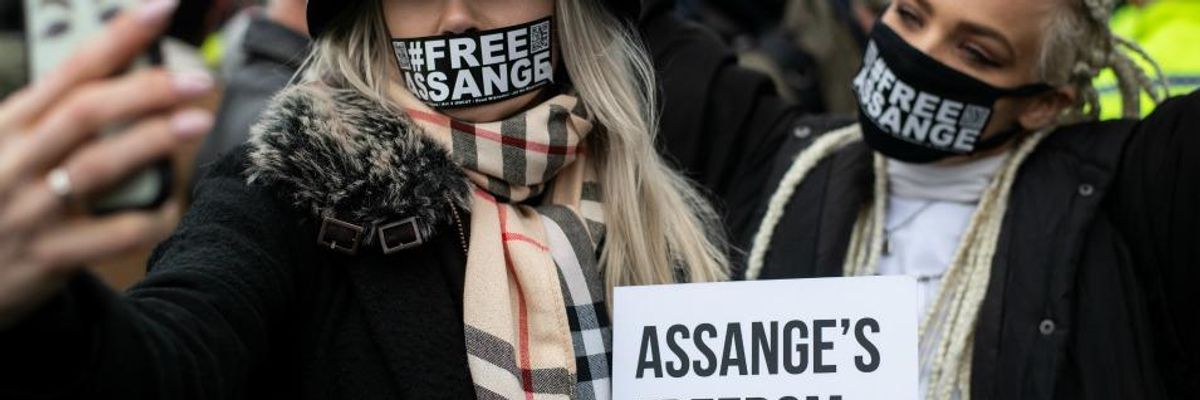Press freedom advocates slammed the U.S. over its pending espionage charges against WikiLeaks founder Julian Assange Monday as the first phase of Assange's extradition trial began in London.
Groups including Reporters Without Borders (RSF) and the Committee to Protect Journalists (CPJ) joined supporters of Assange gathered at demonstrations around the world in demanding the U.K. not allow the Wikileaks founder's extradition to the U.S., where he faces espionage charges for publishing thousands of classified materials regarding U.S. activities--including evidence of war crimes--in Afghanistan, Iraq, and elsewhere.
On social media, the #DontExtraditeAssange hashtag was being used worldwide by those opposed to the treatment of the now famous journalist and publisher.
The trial, supporters said, is about not just Assange's individual fate, but concerns the future of press freedom all over the world.
"The extradition of Julian Assange to the United States to stand trial for his groundbreaking work with WikiLeaks would deal a body blow to First Amendment rights and press freedom. The U.K. should deny this request," said CPJ deputy executive director Robert Mahoney. "Using the draconian wartime powers of the Espionage Act against Assange undermines journalists's rights and sets dangerous precedents that cast journalists and publishers as criminals."
The first phase of the trial is set to last a week and is aimed at determining whether U.S. efforts to extradite Assange are politically-motivated, which would make it illegal under a 2003 treaty between the two countries.
If extradited, Assange could face a prison sentence of up to 175 years for working with former U.S. Army intelligence analyst Chelsea Manning, who leaked documents to WikiLeaks and who has been held for nearly a year in a prison in Virginia for refusing to cooperate with a grand jury subpoena.
Demonstrators assembled outside Belmarsh Prison, where Assange has been held since September, and at other protests around the world, holding signs reading, "Assange's freedom is my freedom" and "Free Assange."
Prosecutors focused opening arguments on government sources who "disappeared" after being put at risk by Wikileaks' release of the documents, which included information about U.S. attacks and civilian casualties in Iraq and Afghanistan. Press freedom groups have argued for years that punishing Assange for disseminating information about U.S. military and diplomatic activities will put all journalists' rights at grave risk.
"Deciding if Julian Assange is a hero or a saint is not the question. Whether we like or don't like Julian Assange is not the question," said Christophe Deloire, secretary-general of Reporters Without Borders, at a press conference in London. "The question is: do we think it's acceptable for a contribution to journalism to be treated as spying? That's the question."
Deloire reported from the trial that while the prosecutor accused Assange of placing individuals in danger, "he was not capable of naming any victims."
Human rights advocates including Amnesty International have in recent days joined in demanding the charges against Assange, brought by the Trump administration, be dropped.
In addition to waging a "full-scale assault on the right to freedom of expression," Amnesty said Friday, the U.S. has taken part in an attack on Assange's human rights as medical experts warn that his imprisonment and the seven years he spent in the Ecuadorean embassy in London have led to "medical neglect and fragile health."
Should he be extradited, Amnesty said, Assange could face further "torture and other ill-treatment, including prolonged solitary confinement."
The Council of Europe's human rights commissioner expressed similar concerns last week.
"Any extradition to a situation in which the person involved would be at real risk of torture or inhuman or degrading treatment would be contrary to Article 3 of the European Convention on Human Rights," said Commissioner Dunja Mijatovic.

